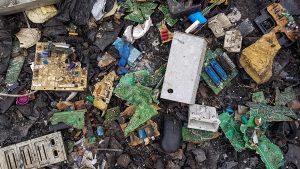“The UK is consistently falling short of its targets.”
Why not take your not-quite working electronic stuff to the next Repair Café?!
.
Unfortunately, during these times, taking care of our rubbish has not been a priority – with plastic, for example:
Refill your plastic water bottle! – Vision Group for Sidmouth
.
We’ve perhaps been better with food waste over the last months:
Food waste – Vision Group for Sidmouth
Looking for Food Waste Heroes – Vision Group for Sidmouth
.
But electronic waste seems to be a big issue:
The growing problem of e-waste – Vision Group for Sidmouth
Even though there are clever things we can do with it:
Turning e-waste into opportunities – Vision Group for Sidmouth
E-waste: recover, recycle, redistribute and reuse – Vision Group for Sidmouth
Reduce e-waste: extend the life of smartphones – Vision Group for Sidmouth
.
However, lack of access to recycling centres has meant more of this stuff is getting thrown away:
Surge in lockdown e-waste heading for landfill, experts fear | inews.co.uk
.
 But, actually, the problem goes further, with a report out last week:
But, actually, the problem goes further, with a report out last week:
Global E-waste Statistics Partnership
Surge in Global E-waste, up 21 per cent in 5 years
.
As reported across the globe:
82 percent of World’s E-Waste Not Recycled | cbronline.com
Study: World’s pile of electronic waste grows ever higher – The Mainichi
World’s e-waste ‘unsustainable’, says U.N. report citing China, India and U.S. – Reuters
E-waste out of control even though Brits sit on £16bn of unused tech | Metro News
.
With a focus from the Resource website on things in the UK:
.
GLOBAL E-WASTE INCREASES BY 21 PER CENT IN FIVE YEARS
… In the UK, all producers of electrical goods are required to recycle their electricals once they become waste under the WEEE Regulations 2013. This can be done through joining a compliance scheme, or, alternatively, businesses provide takeback options in stores. The latter option, however, has been interrupted by the coronavirus pandemic. Covid-19 has negatively affected the entire recycling supply chain, with the WEEE sector facing similar challenges to other sectors of the waste industry, despite promising figures from the first quarter of 2020. The WEEE sector faces additional difficulties as a result of the pandemic, including disruption to kerbside collections and a restricted flow of WEEE to electrical waste recyclers, due to the mass closure of Household Waste Recycling Centres (HWRC).
To soften the impact of the pandemic on the WEEE sector, the WEEE fund announced in May that it will be providing electrical waste recyclers with more than £5 million in financial support. The Department for Environment, Food and Rural Affairs (Defra) also announced last month (8 June) that any methodology for calculating the 2020 WEEE compliance fee will take the impact of the Covid-19 pandemic into account.
The UK is consistently falling short of its targets, with the Environment Agency finding that the 2019 collection figures failed to reach targets for the third consecutive year. With every failed annual national target, the obligated producers must pay a ‘compliance fee’ which goes towards the WEEE Fund, which funds projects designed to support WEEE recycling and reuse.
Scott Butler, Executive Director at Material Focus, said: “Material Focus research has identified that in the UK, we are throwing away or hoarding 490,000 tonnes of domestic and commercial waste, and this is set to grow. Of this alone, UK households are throwing away 155,000 tonnes of domestic electrical waste every year and we are hoarding 527 million small old electricals (weighing around 190,000 tonnes) – nearly 20 items per household. In addition, 145,000 tonnes of commercial and industrial waste is also being thrown away. We have launched the Recycle Your Electricals campaign which is calling on UK households to stop throwing away their electricals and instead start recycling them.”
Material Focus, a non-profit organisation in the UK that works to limit WEEE, recently released a report on UK domestic WEEE, finding that households across the UK are throwing away 155,000 tonnes of small electricals every year. The reuse or passing on of disused electricals could result in potential savings of £370 million for the UK economy and potentially avoid up to 2.8 million tonnes in carbon emissions
Global e-waste increases by 21 per cent in five years | Resource Magazine
.
It really is quite a problem:
The dark side of electronic waste recycling – YouTube
The Problem With E-Waste – YouTube
.
Why not take your not-quite working electronic stuff to the next Repair Café?!
Sidmouth Repair Cafe – Home | Facebook
.
photo: File: Electronic waste at Agbogbloshie, Ghana.jpg – Wikimedia Commons